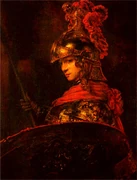No edit summary |
No edit summary |
||
| Line 82: | Line 82: | ||
[[Category:Kings of Persia]] |
[[Category:Kings of Persia]] |
||
[[Category:Heraclidae]] |
[[Category:Heraclidae]] |
||
| − | [[Category:LGBT individuals]] |
||
| ⚫ | |||
| − | [[Category:Templar allies]] |
||
[[Category:Individuals who held Pieces of Eden]] |
[[Category:Individuals who held Pieces of Eden]] |
||
| ⚫ | |||
Revision as of 17:50, 19 May 2020
Alexander III of Macedon (356 BCE – 323 BCE), commonly known as Alexander the Great, was a King of Makedonia who conquered the Achaemenid Empire. For this act, he is heralded as one of the most successful conquerors in history.
Biography
Rise to power
Alexander the Great's empire was backed by proto-Templars, who had entrusted him with a Staff of Eden, explaining why Alexander was able to become so successful and undefeated.[2][3] In addition to the Staff, which reinforced his rule, Alexander wielded the Trident of Eden in battle.[4]
During his successful conquest of the Achaemenid Empire, Alexander and his Macedonians entered Egypt, freeing the land from Persian influence and being saluted as liberators by the populacy. There, Alexander also visited the Oracle of Amun in Siwa, which prophesied his exploits and hailed him as Son of Zeus.[5]
Alexander also attempted to conquer the region of Cappadocia in Central Anatolia, but failed due to his lengthy military campaigns. Instead, an autonomous and independent kingdom was instead established, led by its own king outside of Alexander's kingdom.[6]
Around 330 BCE, Alexander discovered the Herat Temple, an ancient temple built by the Isu, in Herat, Afghanistan. He built the Herat Citadel atop its remains.[7]
After conquering the Achaemenid Empire, Alexander set out to take over the Punjab region of India. In the area between the Jhelum and Chenab River, he encountered a prince named Porus in what would become known as the Battle of the Hydaspes.[1] Despite the Punjab force's numerical superiority, including 200 elephants, Alexander's troops flanked Porus' left side. The maneuver caused the elephants to panic, and Alexander's highly mobile cavalry proved too strong for the Punjab force.[1] Presumably impressed with Porus' military elegance and spirit, Alexander allowed him to retain his kingdom after the battle. Porus became an ally and subordinate ruler of Alexander, until sometime between 321 BCE and 315 BCE, when he was assassinated by Eudemus, one of Alexander's generals.[1]
During his reign, Alexander had created one of the largest empires in the world, and created a new Hellenistic civilization by leaving Greek colonists in his conquered lands. As he continued his conquest of Asia, a group of proto-Assassins realized that Alexander's success could not be caused by military prowess alone, suspecting that he held the Staff.[1]
Death
Thus, in June 323 BCE, the proto-Assassin Iltani infiltrated the palace of Nebuchadnezzar II, where she poisoned Alexander.[8] On 13 June, he died of the poisoning, and his empire soon began to crumble.[1] His body was interred alongside his Staff of Eden in a tomb in Alexandria, the city in Egypt that he founded.[5] The three prongs of his Trident of Eden were split after his death amongst his generals, including Seleucus and Ptolemy.[4]
Legacy
Antiquity
In 48 BCE, Aya and Bayek found the Tomb of Alexander the Great to help Cleopatra impress Julius Caesar. This allowed Caesar's ally Flavius Metellus, a Roman general and leader of the Order of the Ancients, to take Alexander the Great's Staff of Eden.[9] Following the Battle of the Nile, Cleopatra was crowned queen and possessed Alexander's Staff.[10]
Modern times
In 2012, Alexander was one of many historical people included in the Glyph puzzles the late Assassin Clay Kaczmarek had left behind in the Animus as messages for his successor Desmond Miles to decipher. Desmond later did in September of that year.[11] Desmond solved this puzzle, which was part of a set titled "Instruments of Power" where Alexander was excluded from the list of historical individuals revealed by Clay to have wielded a Sword of Eden. He was however, included in the list of historical individuals revealed to have wielded a Staff of Eden.[12]
Behind the scenes
Historically, Alexander the Great was described to have heterochromia, a common characteristic among Sages.[13][14]
Gallery
Appearances
- Assassin's Creed II (mentioned only)
- Assassin's Creed: Revelations (mentioned only)
- Assassin's Creed: Initiates (mentioned only)
- Assassin's Creed Chronicles: India (mentioned only)
- Assassin's Creed: Last Descendants (mentioned only)
- Assassin's Creed: Origins (mentioned only)
References
- ↑ 1.0 1.1 1.2 1.3 1.4 1.5 Assassin's Creed: Initiates
- ↑ Assassin's Creed Encyclopedia
- ↑ Assassin's Creed: Revelations – Abstergo Files
- ↑ 4.0 4.1 Assassin's Creed: Last Descendants
- ↑ 5.0 5.1 Assassin's Creed: Origins
- ↑ Assassin's Creed: Revelations – Database: Cappadocia
- ↑ Assassin's Creed Chronicles: India
- ↑ Assassin's Creed II
- ↑ Assassin's Creed: Origins – Aya: Blade of the Goddess
- ↑ Assassin's Creed: Origins – The Battle of the Nile
- ↑ Assassin's Creed: Initiates – The Desmond Files
- ↑ Assassin's Creed II – Glyph #5: "Instruments of Power"
- ↑ Conradt, Stacy (16-03-2011). The Quick 10: Nine People with Heterochromia (and one without). Mental Floss. Archived from the original on 23 April 2012. Retrieved on 4 May 2020.
- ↑ Pearce, John M. S., "Fragments of Neurological History". Imperial College Press: 2003, p. 248.
| |||||||||||||||||||||||||||||||
| ||||||||||||||||||||||||||||||||||||||||













